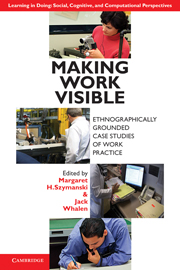Book contents
- Frontmatter
- Contents
- List of Figures and Excerpts
- List of Tables
- List of Contributors
- Series Foreword
- Foreword by John Seely Brown
- Acknowledgments
- Introduction
- Part I Work Practice Study in Historical Context
- Part II Applying Work Practice Methods
- Part III Practices around Documents
- Part IV The Customer Front
- Part V Learning and Knowledge Sharing
- 14 Communal Knowledge Sharing
- 15 Designing Document Solutions for Airline Maintenance Advisories
- 16 Transforming Information System Design
- 17 Rethinking How Projects Are Managed
- Part VI Competency Transfer
- References
- Index
- LEARNING IN DOING: SOCIAL, COGNITIVE AND COMPUTATIONAL PERSPECTIVES
14 - Communal Knowledge Sharing
The Eureka Story
Published online by Cambridge University Press: 05 August 2012
- Frontmatter
- Contents
- List of Figures and Excerpts
- List of Tables
- List of Contributors
- Series Foreword
- Foreword by John Seely Brown
- Acknowledgments
- Introduction
- Part I Work Practice Study in Historical Context
- Part II Applying Work Practice Methods
- Part III Practices around Documents
- Part IV The Customer Front
- Part V Learning and Knowledge Sharing
- 14 Communal Knowledge Sharing
- 15 Designing Document Solutions for Airline Maintenance Advisories
- 16 Transforming Information System Design
- 17 Rethinking How Projects Are Managed
- Part VI Competency Transfer
- References
- Index
- LEARNING IN DOING: SOCIAL, COGNITIVE AND COMPUTATIONAL PERSPECTIVES
Summary
It is widely recognized that an organization's most valuable knowledge, its essential intellectual capital, is not limited to information contained in official document repositories and databases – scientific formulae, “hard” research data, computer code, codified procedures, financial figures, customer records, and so forth – but also includes the mainly undocumented ideas, insights, and practical know-how of its members (Nonaka and Takeuchi 1995; Stewart 1997; Davenport and Prusak 1997; Brown and Duguid 2000; Wenger, McDermott and Snyder 2002; Whalen and Whalen, this volume).
This more tacit or informal knowledge is deeply rooted in the experiences of individuals and the culture of their work communities. It commonly originates as practical solutions – through everyday inventions and discoveries – to the exigencies of work, and thus serves as the critical resource for ordinary work practice. Much of this knowledge often remains embodied in practice. Crucial steps in a new practice and fresh solutions to recurrent conundrum are commonly shared through conversations and stories among small circles of colleagues and work groups, with members filling in the blanks from their own experience. These instructions and stories are expressed in the local community vernacular.
The challenge for organizations is to somehow convert this valuable but largely local knowledge into forms that other members of the organization can understand and, perhaps most important, act upon.
- Type
- Chapter
- Information
- Making Work VisibleEthnographically Grounded Case Studies of Work Practice, pp. 257 - 284Publisher: Cambridge University PressPrint publication year: 2011
- 2
- Cited by



